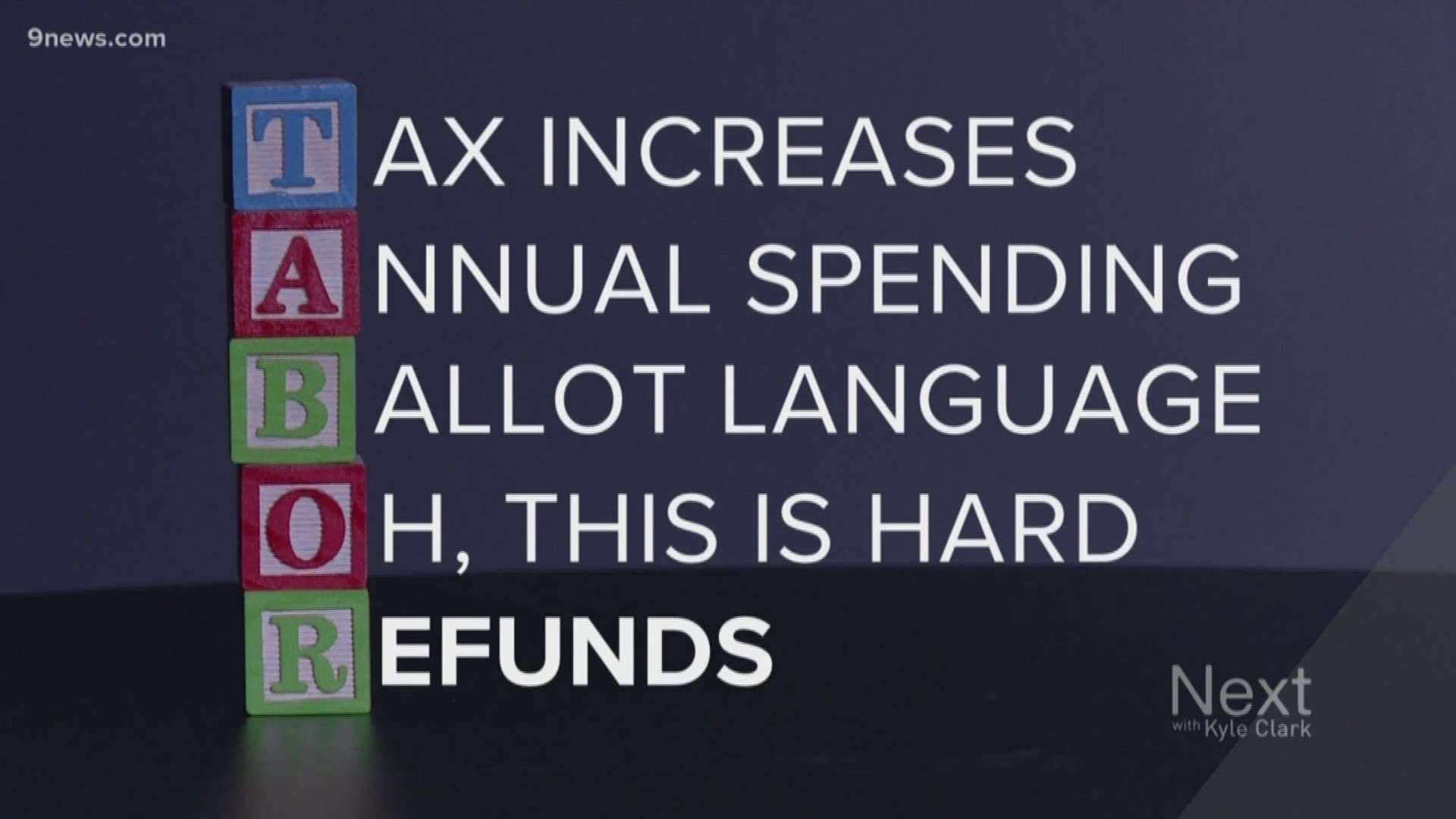DENVER — The Colorado State Supreme Court has ruled that a ballot issue to repeal the Taxpayers Bill of Rights -- TABOR -- can happen in a single ballot question.
On Monday, in a 5-2 ruling, the Colorado Supreme Court determined that a ballot question asking to repeal TABOR meets the state's single subject requirement.
In Colorado, ballot issues, even bills at the legislature, must fit under a single subject to comply with state law. Issues that cover multiple topics are not allowed.
TABOR, which voters passed in 1992, covers multiple topics, but was passed two years before voters approved the single subject requirement.
Don't know what TABOR does? Here's a quick primer:
T: Tax increases are put to a vote of the people
A: Annual spending limits - the state can only keep and spend an amount based on a specific formula
B: Ballot Language - tax or revenue questions must be worded a specific way in all capital letters
O: Oh boy, this is harder than I thought
R: Refunds - if the state collects more money than the formula allows, residents are given refunds
In January, the Colorado Fiscal Institute proposed a ballot issue that would repeal all of TABOR. That proposed ballot issue read:
Be it Enacted by the People of the State of Colorado:
SECTION 1. In the constitution of the state of Colorado, repeal section 20 of article X."
In English, that means do you want to repeal TABOR or not.
The state's title board, which is made up of the Attorney General, Secretary of State and Director of Legislative Legal Services (or representative from their offices), vet proposed ballot issues before they can be put before voters.
In January, the title board did not move forward with this ballot issue because it determined that a complete repeal of TABOR would violate the state's single subject rule.
The Colorado Supreme Court determined that it does constitute a single subject.
"The initiative could not be written more simply or directly. It essentially asks voters a single question: should TABOR be repealed in full?" Justice Richard Gabriel wrote for the majority. "To the extent that prior decisions from this court have said that if a constitutional provision contains multiple subjects and an initiative proposes to repeal the entire underlying provision, then the initiative contains multiple subjects, we conclude that those decisions are not binding under principles of stare decisis and are not analytically sound, and we disapprove them," Justice Richard Gabriel wrote for the majority.
In 1996, an attempt to repeal TABOR and reenact portions of it was rejected by the Colorado Supreme Court. At the time, the justices wrote that that decision was based on what would have been a partial repeal of TABOR.
In writing the dissent, Justice Monica Marquez said about the 1996 case, "if a partial repeal of a multiple subject provision violates the single subject amendment, then surely a full repeal does as well."
Justice Marquez also wrote that based on this decision, voters could try to repeal the state constitution's entire Bill of Rights, even though that would cover multiple subjects.
"To offer an extreme example, under the majority’s logic, voters could repeal our state constitution’s entire Bill of Rights through a single initiative and do away with religious freedom, free speech, protections against unreasonable searches and seizures, the right to bear arms, the prohibition against cruel and unusual punishment, and due process, among a host of other rights," Marquez wrote in dissent. "Under today’s ruling, such an initiative, 'which would ask voters the single question of whether [The Bill of Rights] should be repealed, constitutes a single subject.' Such a result cannot have been the voters’ intent in adopting the single subject requirement."
Gov. Jared Pols (D) has said he does not support a full repeal of TABOR. The day after he was elected, Polis appeared on Next with Kyle Clark.
"You've talked proudly in the past about taking on the Taxpayer Bill of Rights at the ballot box. Are you committed to keeping the provision of TABOR that allows Coloradans to vote on tax increases?" asked Clark.
"Absolutely," said Polis.
"One hundred percent?" asked Clark.
"Absolutely," said Polis.
The Colorado Fiscal Institute has multiple TABOR-related ballot issues in front of the state title board.
"In answering this important question today, the Colorado Supreme Court has given voters additional options for addressing the fiscal challenges the state faces. Today's opinion clarifies voters' role in making changes to their state constitution. I'm thrilled that those options include a full repeal of a provision that has made Colorado an outlier on state tax policy for nearly 30 years," said Colorado Fiscal Institute Executive Director Carol Hedges.
Will Colorado Fiscal Institute attempt a full repeal of TABOR in 2020?
"As I often say to my children, everything involves a trade off. I think a 2020 election year is great because turnout is great. People are really focused because it's a presidential year, but the trade off is that media time is much more expensive. Trying to attract attention to this kind of an issue is much more difficult. Finding people who are willing to knock on doors and be a part of that community conversation becomes more complicated," said Hedges.
Colorado Rising Action is against any changes to TABOR, but was not a party to the case.
“TABOR is so wide-ranging, it’s clear the courts got this one wrong. Not to mention, voting on tax increases and controlling the size of government is extremely popular among Coloradans across the board - we’ll take on this and any other fight in which groups of activists try to destroy the Taxpayer’s Bill of Rights,” said Colorado Rising Action Executive Director Michael Fields.
SUGGESTED VIDEOS | Local stories from 9NEWS

